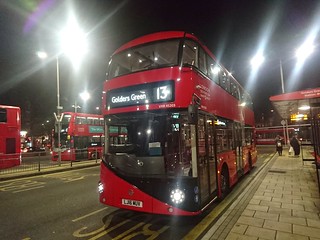At last, Volvo has unveiled the B5LHC
Double-Deck Electric Hybrid chassis at the Euro Bus Expo show in Birmingham.
What I found interesting was that they unveiled it with the SRM body.
From Volvo Buses
The Volvo B5LHC Double Deck
builds on the success of the Volvo 7900 Single Deck Electric Hybrid bus
launched in 2014. The Volvo B5LHC Electric Hybrid driveline is an
extension of the well-proven technology used as standard in the Volvo B5LH
Hybrid. The difference lies in a more
powerful electric motor, increased capacity Lithium Ion battery rated at 19kWh
and equipment for opportunity charging.
The new Volvo B5LHC has the ability to operate with zero tail pipe emissions in
electric mode for around 7 kms between charging. This means less noise and cleaner air not only on the
route but at bus stops and end terminuses. Once outside city centre zero emissions zones, the B5LHC has the ability to
perform as an efficient hybrid vehicle, giving greater flexibility and operating range. Designed with regenerative
braking, energy usually lost to braking is recovered to further enhance
efficiencies and extend the electric range.
The B5LHC shares the same
conductive opportunity charging system used on the full Electric 7900E and
Electric Hybrid 7900EH vehicles, giving flexibility and interoperability for
operators and local authorities. Charging is fully automated and takes between
three and six minutes. The infrastructure creates new opportunities for urban
planning, for example allowing for the design of indoor bus terminuses.
The charging system can be integrated into any part of the city streetscape;
each charging solution includes the complete interface between the power
network, the energy supplier, the equipment and the vehicle.
It uses a pantograph which makes physical contact with the bus from
above. This optimises charging efficiency and provides the ability to safely
charge whilst passengers embark and disembark. All moving parts are integrated
into the charging system, while the contact rails on the bus are fixed-mount
connectors. This minimises the need for additional maintenance on the bus and
reduces vehicle weight, which in turn increases passenger capacity and vehicle
efficiency.
A mock-up of the charging
infrastructure will be displayed on the Volvo Bus stand at the Euro Bus Expo
show at the NEC in Birmingham 1 – 3 November.
The new Volvo B5LHC is the latest product from the Volvo Electromobility
range to be released as part of the wider City Mobility and Electromobility
strategy. Electromobility is the range of vehicles and solutions that can be
used in modern smart city operations; the range includes Hybrid, Electric
Hybrid and Full Electric vehicles along with connected services and maintenance
packages tailored to the life of the transport system. City Mobility is the
infrastructure and planning aspect of Volvo’s strategy to introduce ever more
sustainable transport solutions.
The first Volvo Hybrid Double
Deck was introduced in UK in 2009 - by the end of 2016 there will be more than 1,500 in service.
The launch vehicle – which has
been built to Transport for London (TfL) specification and features the SRM body style developed by Wrightbus – is
scheduled for evaluation in London during 2017. Certified with a passenger
capacity of 87, the new Electric Hybrid Double Deck has 43 seats on the top
deck with 17 seats in the lower saloon to a two-door specification.
The chassis specification
includes Volvo I Shift automated transmission, electrically controlled air
suspension with kneeling function, electronically controlled disc brakes with
brake blending and a spacious driver’s environment with Volvo dashboard.
TfL’s Managing Director of
Surface Transport, Leon Daniels, is due to formally receive the new vehicle
from President of Volvo Buses, Håkan Agnevall at Euro Bus Expo, which is the
UK’s biennial exhibition for the bus and coach sector.
Speaking ahead of the show,
Managing Director of Volvo Bus in the UK & Ireland Nick Page, said: “The
new Volvo B5LHC Electric Hybrid is an exciting addition to our city bus range,
saving up to 75% in diesel fuel cost compared to an equivalent diesel double
deck bus. C02, NOx and particulate emissions are also reduced in proportion,
improving air quality and noise levels – something that will be increasingly
required in our towns and cities.
“We already have a proven
pedigree here in the UK with more than 1,500 Volvo Hybrid Double Deck buses
both in London and beyond, so this is another exciting step along the road to
further emission-free operation, with all the environmental and societal
benefits that this can bring.”
The issue here is with the luggage compartment which I think is too
high due to the placement of the batteries. A photo can be viewed here.
This electric hybrid system is similar to the Alexander Dennis Enviro400H MMC Virtual Electric. There are three of these buses
currently operating on route 69.
On the 2nd November 2016, the SRM with the Volvo B5LH
chassis (VHR45203) finally entered service on Route 13.
And here’s the photo of the SRM on route 13.
As always, I invite you to follow me on Twitter and Google Plus
which is @CLondoner92


